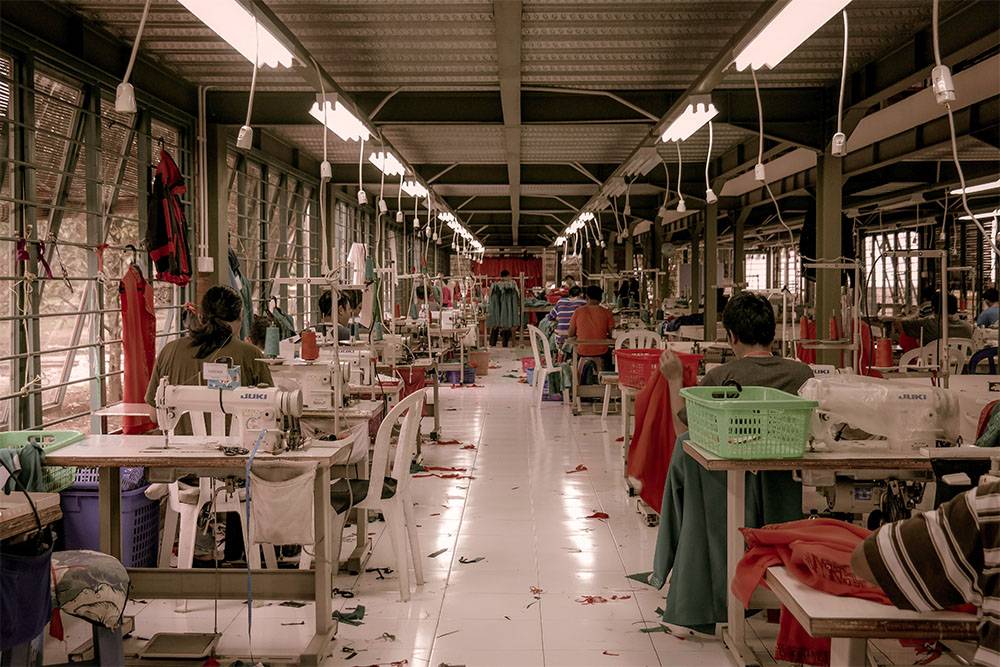
The fast fashion industry is still breaking the law when it comes to labor rights. Human rights violations and sweatshop-like working conditions affect millions of workers in textile and garment manufactures.
Child labor and modern slavery cases are still being reported, particularly in Asian developing countries such as Bangladesh, Indonesia, Sri Lanka, and The Philippines.
Many factory workers are paid below the legal minimum wage, forced to work long hours in unsafe environments, don't have access to healthcare or paid leaves.
Workers won't resist for fear of getting fired since they need their job to nourish their families. Many young women work in garments factories, being sexually abused, and forced to abort their pregnancy.
Many facts about fast fashion are very shocking, and not enough people are aware of how awful this business model is. The fast fashion industry is very damaging to people and local communities.
To help you make mindful purchasing decisions as an informed consumer, here is the truth about workers' conditions that the fast fashion industry doesn't want you to know.
If you'd like more information about the disastrous impact of fast fashion on garment workers, check out our selection of must-read books on fast fashion or watch these short documentaries on the fashion industry.
Panaprium is independent and reader supported. If you buy something through our link, we may earn a commission. If you can, please support us on a monthly basis. It takes less than a minute to set up, and you will be making a big impact every single month. Thank you!
Unlivable wages
For budget-conscious consumers, fast fashion is affordable, fun, and convenient and offers a large variety of styles every week to satisfy the need for an ever-changing wardrobe.
For textile workers, however, fast fashion means low wages, terrible working conditions, and abuse. They work on farms and garments factories, being exploited and forced to work for less than they'd need to live.
The fast fashion industry exploits local and underserved communities in sweatshops to produce cheap garments. It employs more than 300 million people in the whole world but doesn't pay living wages.
Poorly paid employees and dangerous working environments are numerous among fast fashion brands and retail giants.
Fast fashion brands and retailers push for lower production costs to increase their profit margins and meet customer demand. Meanwhile, manufacturers keep wages unlivable and working conditions terrible.
The majority of fast fashion production occurs in overseas countries with poor labor laws and human rights protections. Many farmers and garment factory workers live in low-income countries, where labor is shockingly cheap.
It's hard to believe, but many garment factories run with sweatshop-like working conditions, even in the United States. The Labor Department investigates new allegations of wage violations at sewing contractors in Los Angeles every year.
Labor rights violations are still occurring every day in the United States. Garments workers don't receive fair wages as often as they should in Los Angeles, as seen in Remake's film "Made in America."
The U.S. Department of Labor reports that in Los Angeles, more than 50,000 mostly immigrant women work in clothing production. And 85% of factories violate labor laws, federal wage, and hour laws.
"Brands that proclaim their produces are 'Made in America' may present the idea of ethically-made clothing, but the truth is that garments factories in Los Angeles can still be equated to sweatshop-like environments, with products being made for less than minimum wage under dangerous working conditions."
- Alison Morse, award-winning author, and top industry thought leader
Excessive working hours
In the fast fashion industry, textile workers commonly work for low wages and under terrible working conditions. They work on farms and garments factories, being exploited and forced to work over 100 hours every week.
The most popular fast-fashion retailers in the world push new collections to high-street stores in a short time as a fast response to consumer demand.
The traditional 2 to 4 seasons each year for new collections is no more. 52 seasons replace them each year. Retailers release new styles and collections every week.
So they keep pushing for lower production costs and faster delivery times to meet customer demand. And garment workers are forced to work excessively long hours every day to deliver.
Workers hardly receive protection in the fast-fashion world. Research in numerous factories reveals many cases of verbal misconduct, forced overtime, dirty drinking water, and pressure not to use the bathroom.
Workers sometimes don't even receive their wages after working for more than 100 hours weekly. In East Asian countries like Bangladesh, garment workers endure consistent social and labor issues.
Forced and child labor
Fast fashion gives jobs and a way to earn a living to underserved populations in low-income nations and even Western countries. Unfortunately, it also exploits and abuses farmers and workers to keep production costs low.
Fast fashion is responsible for forced and child labor in countries like Bangladesh, China, Indonesia, the Philippines, and Vietnam.
Low wages, long work hours, unsafe conditions, sexual abuse, and physical assaults are numerous in the fast fashion industry.
Many fast fashion brands and retailers don't oversee their supply chain as they should. They let child labor and modern slavery happen in cotton farms and garment factories.
Many cases of child labor, sexual abuse, and physical assault were reported in cotton farms and garment factories, working for major fast fashion brands.
Children are taken from school, neglecting their education. They work on farms or factories as are no better schools for them in some small towns. Many believe that they are better off working to nourish their future.
Inhumane manufacturing practices and human rights violations are illegal. Local authorities are trying to enforce ethical clothing production methods but fail to do so.
Many sweatshops also manage to run illegally. Garment manufacturers force employees to do crazy amounts of work under terrible conditions and drive hundreds of workers, spouses, or children to suicide every year.
"With the meager wages we get, we do not have enough funds for the most basic requirements for our families. We work long hours, usually 12, 16, and sometimes 24 hours a day to earn more. Because of this, we do not have any time to spend with our families or to play with our children. [...] We are nothing but slaves. Many people here have lost their lives because they could not afford to go to a private clinic or a private hospital. [...] Whichever political party comes to power in the state or at the center they will provide no solution to our misery."
- Ibrahim, a 27-year-old cutter at a Tirupur garment factory
Physical and sexual abuse
Women especially are the victims of fast fashion as they are subject to daily violence based on their gender. Across Asia, women working in supplier factories constantly report physical abuse.
The pressure to meet production targets is so high that garment supply chains incite violence. Women face gender-based violence and harassment at work as they occupy short-term, low-skill, and low-wage positions.
In India, women make up between 60 and 75% of the garment workforce. And women workers represent between 80 and 95% of the garment workforce in Bangladesh, Cambodia, Indonesia, and Sri Lanka.
Systemic sexual harassment and violence at work are daily occurrences for female factory workers. The fast fashion industry imposes excessive overtime, low pay, long working hours, and unrealistic production targets.
Female workers experience obscene gestures, sounds or stares, offensive emails, texts, or behavior that impact their safety, such as being followed home.
Women are left worried, stressed, anxious, and suffer depression. And they are too afraid to speak up, fearing the loss of their jobs or further harassment.
Fast fashion has so many negative impacts on working conditions. It doesn't promote a fair workplace, gender equality, diversity, or inclusivity. Instead, it fosters a culture of discrimination, harassment, and violence.
Health and safety issues
Most fast fashion pieces are produced in the world's poorest countries, like Bangladesh, Cambodia, Vietnam, Sri Lanka, Indonesia, and the Philippines.
Fast fashion creates unfair and unsafe work conditions responsible for the death of thousands of people in catastrophic events, such as the Rana Plaza garment factory collapse in Bangladesh.
It was the deadliest clothing manufacturing accident in history. In 2013, the eight-story commercial building called Rana Plaza collapsed. It killed 1,134 garment factory workers and injured around 2,500 people.
Fast fashion brands and retailers put pressure on clothing manufacturers to keep labor extremely cheap, which results in disastrous death tolls.
"Virtually every major brand that we shop at is producing in Bangladesh. I would say the problems at Rana Plaza are not specific to that building, and they're not just specific to the brands operating in that building"
- Elizabeth Cline, author, journalist, and expert on consumer culture, fast fashion, sustainability, and labor rights
Fast fashion also involves chemical-intensive processes such as intensive farming, textile washing and bleaching, fabric dyeing and treatment. The massive use of hazardous chemicals endangers farmers' and workers' health.
Toxic chemicals in dyes, fertilizers, and pesticides pollute the air, land, and water sources. They are highly damaging to the skin and health of farmers and workers in garment-producing factories.
People are exposed to harmful pollutants contained in microplastics by drinking polluted water and eating contaminated seafood. People working in garment factories, wastewater treatment facilities, cruise ships, and fish farming industries are particularly endangered.
Hazardous chemicals cause burns, vomiting, diarrhea, reproductive disorders, immune-system disruption, endocrine disruption, impaired nervous system function, development of certain cancers, drowsiness, or death.
Too many fast fashion brands use sweatshop-like work conditions in their garment factory. There maintain poor working conditions and low wages to benefit from a higher profit margin on their products.
They claim to improve their processes and instore ethical production practices, but they provide very little evidence to verify their claims about their social impact.
Fast fashion retailers don't control their supply chain effectively enough to prevent human rights violations. They are also not transparent enough in their activities to improve health and safety in their factories.
All farmers and workers across fashion supply chains should have access to living wages, normal working hours, skills training, healthcare, paid leaves, food service, and unions protecting their rights.
People employed at unlivable wages for long hours (over 16 hours a day) and under poor conditions shouldn't be a thing anymore. Child labor and forced labor have no place in a developed and civilized society.
Thankfully, you have the power to drive positive change in the fashion industry. Choose ethically fashion and don't support companies that violate human rights.
Consumers buying power can prevent the abuse going on in farms and factories in developing countries. Buy clothing from ethical brands that promote sustainable production methods and the fair treatment of all workers.
References:
- Clean Clothes Campaign (2019-09-16). "We go as far as brands want us to go"
- Aljazeera (2015-05-19). No action as Argentina's illegal sweatshops flourish
- The Guardian (2019-04-07). Revealed: women making clothes for west face sexual abuse
- U.S. Department Of Labor (2012-12-13). Extensive violation of federal state laws found among garment contractors at Los Angeles fashion district location
- International Labor Rights Forum (2011-07-22). Carter's Victory! Will Aeropostale, Forever 21, Urban Outfitters and Toys R Us Stop Forced Child Labor in Cotton?
- International Labour Organization (2020-02-05). Forced and child labour in Uzbek cotton fields continues to fall
- Human Rights Watch (2020-01-14). World Report 2020
- Asia Floor Wage Alliance (2020-05-01). Defend Union Rights! Struggle for a Living wage!
- World Socialist Web Site (2010-12-31). Tirupur suicides: The human cost of India's capitalist expansion
- Asia Floor Wage Alliance (2019-10-01). Gender Based Violence in the H&M Garment Supply Chain
Was this article helpful to you? Please tell us what you liked or didn't like in the comments below.
About the Author: Alex Assoune
What We're Up Against
Multinational corporations overproducing cheap products in the poorest countries.
Huge factories with sweatshop-like conditions underpaying workers.
Media conglomerates promoting unethical, unsustainable products.
Bad actors encouraging overconsumption through oblivious behavior.
- - - -
Thankfully, we've got our supporters, including you.
Panaprium is funded by readers like you who want to join us in our mission to make the world entirely sustainable.
If you can, please support us on a monthly basis. It takes less than a minute to set up, and you will be making a big impact every single month. Thank you.































0 comments